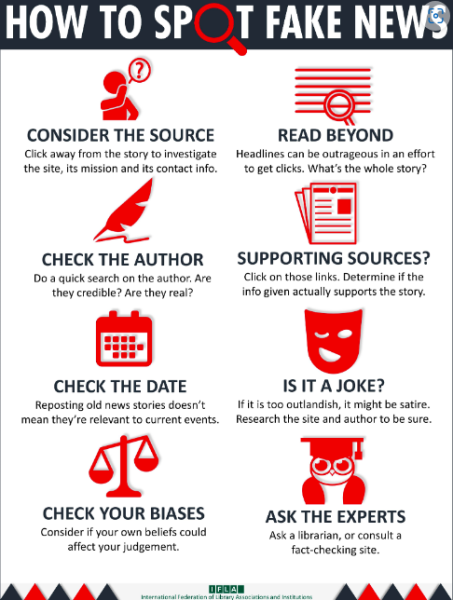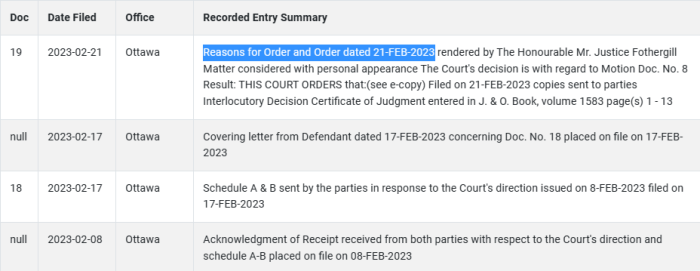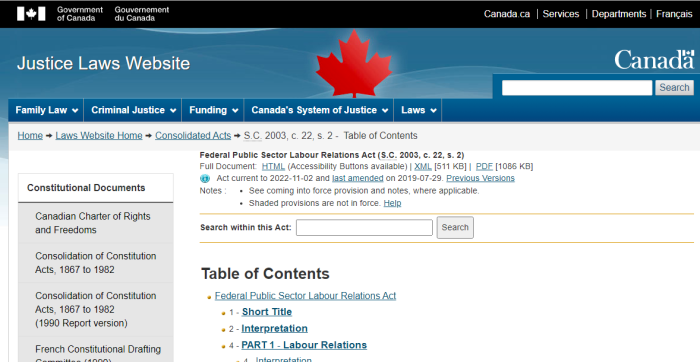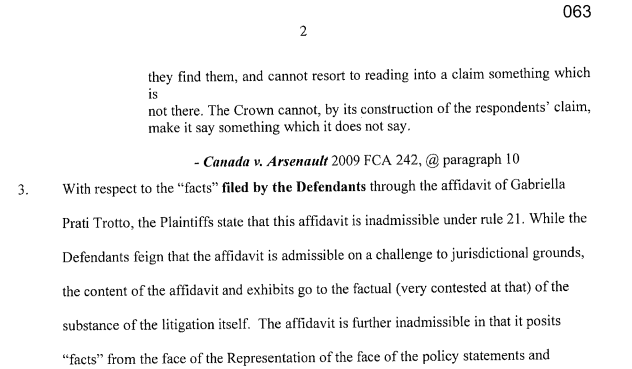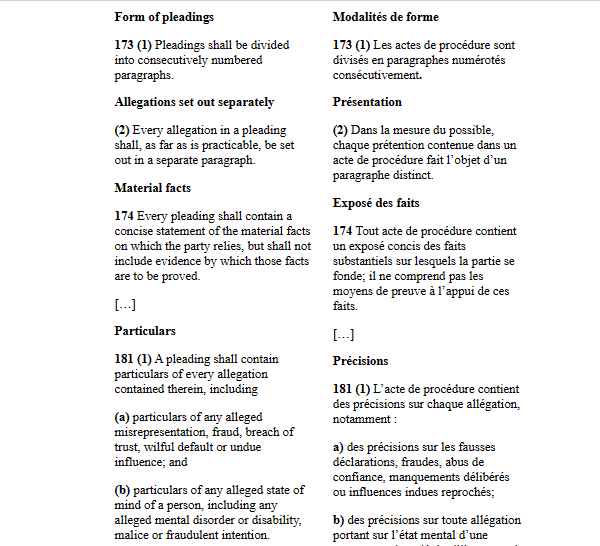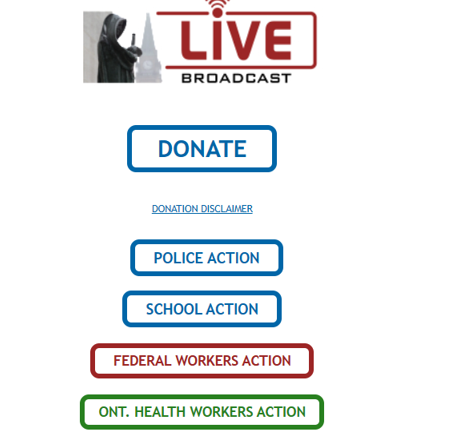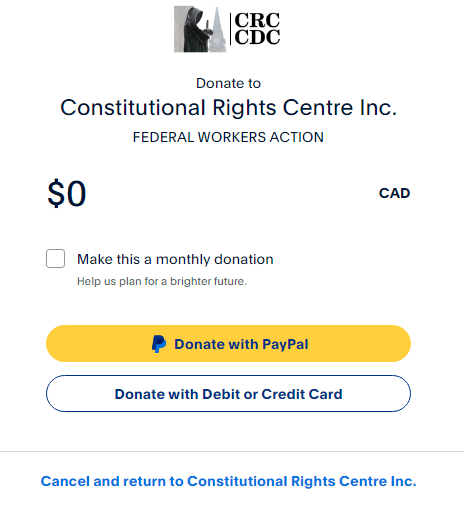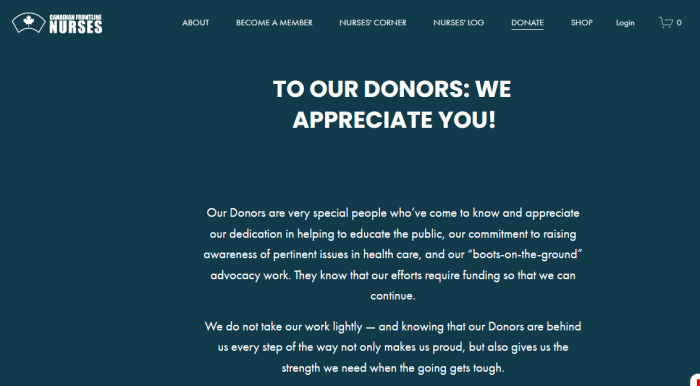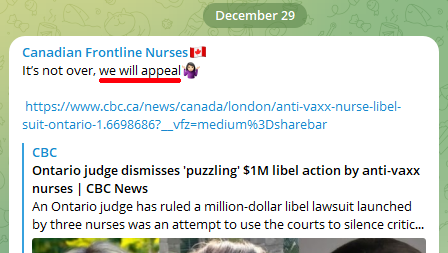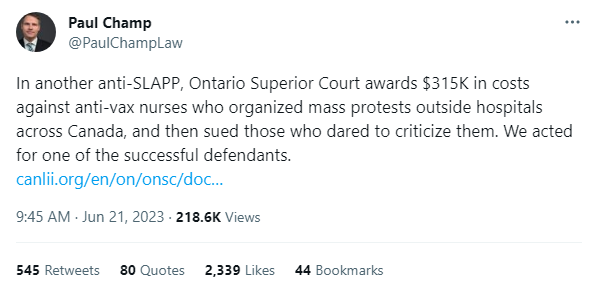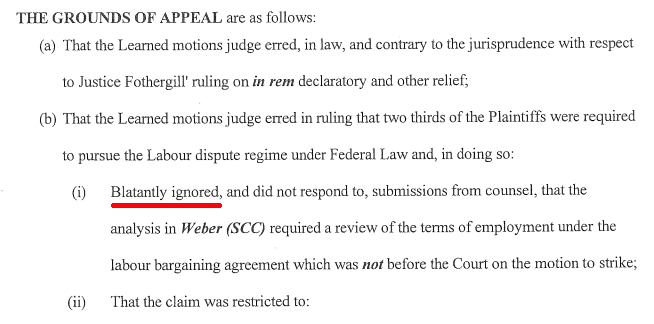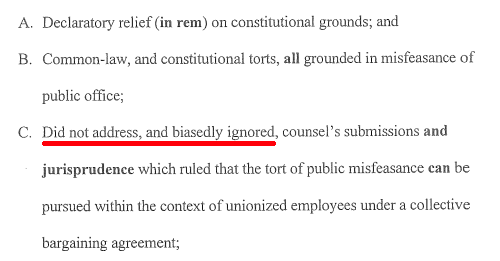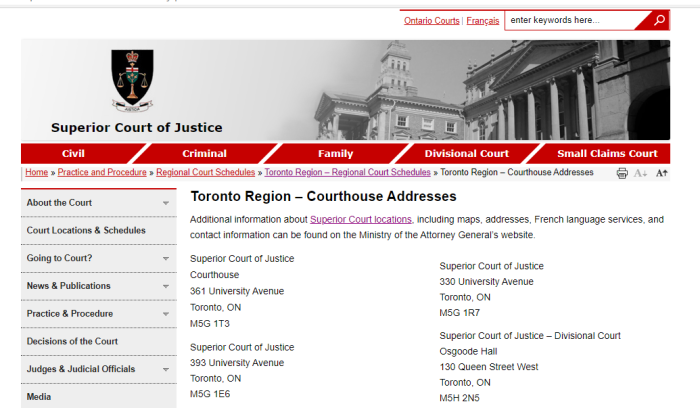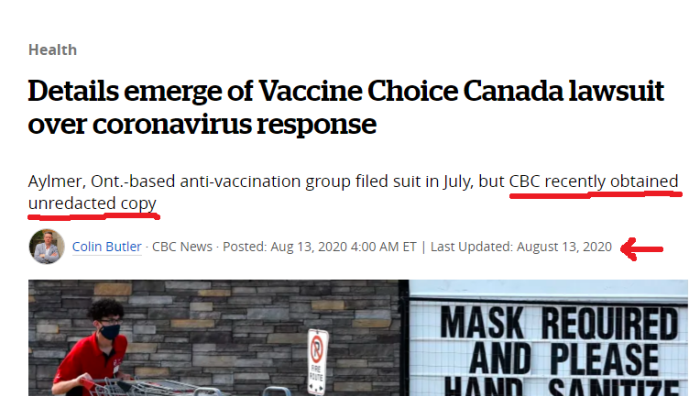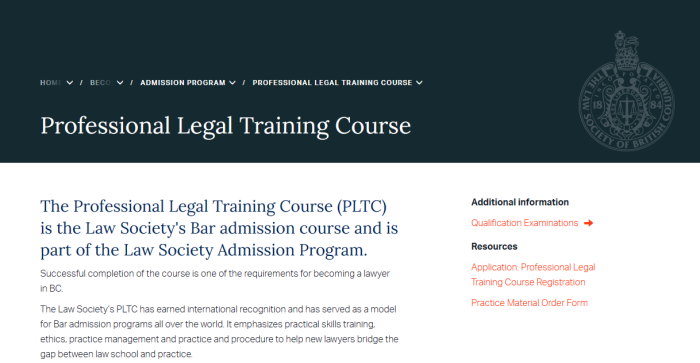
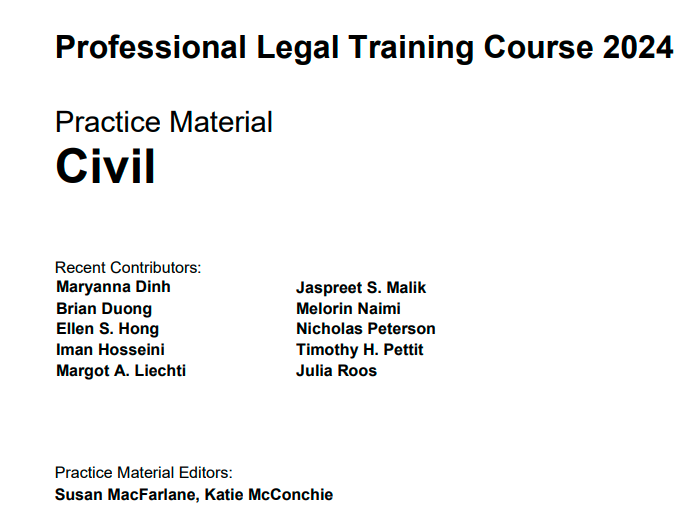
The Law Society of British Columbia (LSBC) has released the 2024 edition of their Professional Legal Training Course (PLTC). The infamous Action4Canada suit, led by “Mr. Bad Beyond Argument”, makes another appearance. The Notice of Civil Claim, NOCC, had been struck in its entirety. This was in the 2023, and was kept in this edition as an “educational exercise”.
Instead of rewriting the NOCC, as was permitted, the case was appealed. Recently, the B.C. Court of Appeal laughed Action4Canada out of there, stating they didn’t understand what was being challenged.
For more background information, here’s the earlier piece. In short, the LSBC is responsible for licensing lawyers (both new and old) in this Province. One of the requirements is that prospective lawyers — articling students — demonstrate a minimum competency in the law.
There are reasons for doing this. It’s in the public’s benefit that members of a “regulated profession” prove themselves to be intelligent and competent in their field. It hurts clients when they retain lawyers or paralegals who have no clue what’s going on. It also can clog the Courts when countless Appeals are launched on the basis of “ineffective assistance of counsel”.
(1) Despite fundraising since the Summer of 2020, nothing was actually filed until August 2021, nearly a year later. What finally came was a 391 page convoluted mess.
(2) August 2021: This critique was published. It quoted Rules 3-1, 3-7 and 9-5 of Civil Procedure for British Columbia. In short, it failed to meet even the basic requirements of a pleading. The site was sued a week later over it, after it allegedly caused donations to plummet.
(3) October 2021: The Defendants start issuing responses to the 391 page Claim.
(4) January 2022: Defendants being filing Applications to Strike the Claim, given how incoherent it is, and impossible to follow. This wasn’t a determination on the merits, just the quality of the writing. The reasons cited include many that the Canuck Law article had published.
(5) May 2022: The Application to Strike is finally heard. It’s worth hearing what it was about. The Claim was so long, confusing and convoluted, that it was impossible to respond to it in any meaningful way.
(6) August 2022: The Claim was struck as “bad beyond argument”. It was officially struck for being prolix and confusing, although many errors were outlined. However, Justice Ross did allow it to be rewritten, saying there was a prospect that a valid Claim could be filed.
(7) September 2022: Even though the decision was a humiliation, Gaw took to the alternative media to proclaim that it was “really a win”, and that Justice Ross had accepted the case as valid. This was a gross distortion of reality.
(8) September 2022: Instead of simply rewriting an amended Notice of Civil Claim, the case was appealed. No real explanation of that was ever given.
(9) February 2023: The Law Society of British Columbia includes the Action4Canada pleading in their Professional Legal Training Course (PLTC). This is one of the courses that prospective lawyers are required to take before letting licensed. This case is actually used as a teaching exercise in how not to draft documents.
(10) February 2023: The Federal (Adelberg) case is struck as “bad beyond argument”. Justice Fothergill references the Action4Canada case, and concludes it has many of the same defects.
(11) October 2023: No serious attempt had been made to book the actual hearing, which is why the Appeal became classified as “inactive”. If the date isn’t booked within 12 months after filing the Notice of Appeal, this is done automatically.
(12) October 2023: Just days after bring criticized for the lack of a hearing, A4C books the date for February. It seems that public scrutiny forced them to move ahead. Perhaps the goal was to just let the Appeal get thrown out as “abandoned”.
(13) February 2024: The LSBC posts their latest edition of the Professional Legal Training Course (PLTC), and the Action4Canada case is still in it. The overall text has been updated (from 140 pages to 147), but the editors still thought it was worth keeping in.
(14) February 2024: The Action4Canada Appeal is heard, and promptly dismissed.
(15) February 2024: Despite being laughed out of the Court of Appeal, Action4Canada insists that it was really a win, and that things are moving along.
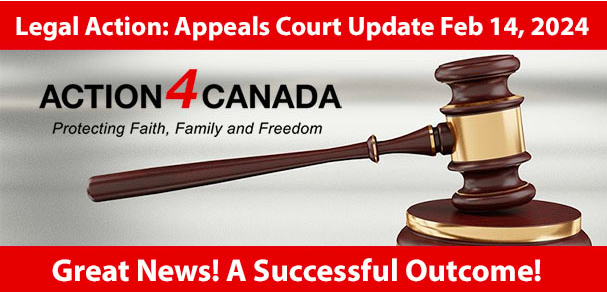
On their website, Action4Canada called it a victory, being able to rewrite the NOCC. It didn’t seem to matter that the Claim had been struck in its entirety.
The Appeal was also thrown out, which was called a “successful outcome”.
This is some pretty delusional stuff.
If pleadings are inadequate the matter will typically not get as far as trial. In a recent example of wholly inadequate pleadings, the plaintiff filed a 391-page notice of civil claim that was struck (see §2.06(3) below on striking pleadings) as being “prolix” and “bad beyond argument.” In Action4Canada v. British Columbia (Attorney General), 2022 BCSC 1507, the plaintiffs sued a host of politicians and crown corporations over pandemic-related measures they said were not based in science, exceeded the defendants’ authority, and breached Charter rights. The notice of civil claim was struck in its entirety. The judge said (at para. 51) it is counsel’s job to draft pleadings that do not offend the Rules. The judge also said the claim was too prolix for the defendants to be able to respond, and it was not the court’s job to interpret the claim:
To put those points another way, I have indicated above that the prolix nature of the NOCC makes it impossible for the defendants to respond to it. For the same reason, I am not able to parse the 391 pages of the improperly drafted NOCC and indicate whether paragraphs, categories or claims should remain in, or should be struck. That is not the proper role of this court. It is counsel’s obligation to draft pleadings that do not offend the mandatory requirements of the Rules.
On those few pages, starting at #15, the Law Society not only roasts Action4Canada, but goes on to explain how pleadings should be drafted. Again, this is written for articling students working towards a license. It’s not designed for 30+ year veterans of the profession.
Bonnie Henry, John Horgan, David Eby, Adrian Dix, and all the others are not scared by this lawsuit. In fact, if any of them are aware of it, they’re probably having a good laugh. How could anyone be gullible enough to donate, or to be a client?
5. Pleading the Facts
Plead a “concise statement of the material facts giving rise to the claim”: SCCR 3-1(2)(a).
The “material facts” are those facts that are essential to forming a complete cause of action or defence, as the case may be: Young v. Borzoni, 2007 BCCA 16 at para. 20. The evidence that tends to prove those facts should not be pleaded (SCCR3-7(1)). Suppose the issue is whether X has authority to make a certain contract on behalf of the defendant. It is sufficient for the plaintiff to plead that “the defendant employed X as agent to make the contract on his behalf” or that “the defendant held out X as having authority to make the contract on his behalf.” It will be unnecessary and improper to plead that “X has been employed by the defendant for many years to execute contracts of this type on his behalf” or that “the defendant informed the plaintiff that X was the defendant’s agent.”
The material facts part of the pleadings should not include matters of law. However, if a particular statute is relied upon as the foundation of a claim or defence, you must plead the facts necessary to bring the case within the statute.
When pleading the material facts, be clear and brief. There should be no ambiguity in the allegations. Set out each separate allegation of fact in a separate paragraph, so that the defence, in responding to the pleading, will admit or deny each fact separately. The danger in combining facts in a larger paragraph is that defence counsel, in seeking to deny any part of that paragraph, would deny it all. That would put plaintiff’s counsel to the burden of proving facts that might not really be in dispute.
In drafting allegations of fact, avoid colouring them, as that might force the other side to deny what would otherwise be basic facts. For example, in a motor vehicle action, it is good practice for the plaintiff’s counsel to set out the fact of a collision (which likely will be admitted) and then in a separate paragraph set out the allegations of negligence of the defendant (which will be denied). Avoid, for example, combining the facts and allegations of lawful right or fault. If the pleadings state, for example, that the plaintiff was “driving in a lawful manner south on Granville Street,” then defence counsel will deny the entire allegation.
When drafting pleadings, it is often helpful to refer to a precedent as a guideline. However, never follow a precedent blindly. You should know what context it was created for, and how you should adapt or modify it. For example, some plaintiffs’ counsel make it their practice to allege in every case that the defendant driver’s ability to drive was impaired by alcohol or a drug. If the plaintiff is a passenger in the defendant’s motor vehicle, such a pleading opens the door to the defence to plead that the plaintiff was contributory negligent or accepted the risk of riding with an impaired driver. Furthermore, if the defendant was impaired, that fact might affect their insurance coverage. You should consider precedents carefully and modify them as needed.
6. Pleading the Relief Sought
The plaintiff must set out the relief sought against each named defendant: SCCR 3-1(2)(b). Tell the court what your client wants: for example, an injunction, a declaration, or damages.
Consider carefully any declarations you may be able to obtain from the court. When a court makes a declaration, it “declares” what the law or a fact is. It is not making an order. Declarations can establish a party’s standing and legal rights, which can significantly determine the outcome of a proceeding.
Having a role in this book both in 2023 and 2024 is hardly something to be proud of. This is an educational book for articling students, who haven’t even passed the bar. It’s not just the the NOCC was bad, it’s that the LSBC thinks it’s worth using as an example.
The Action4Canada case could have been so much better if this section had been observed when drafting the NOCC.
- There should have been short, concise paragraphs, each alleging a single fact. Instead, many paragraphs were between a half and full page each, containing many unrelated allegations. This made it simpler for Defendants to simply deny everything.
- By not having clear and concise facts — many of which may have been admitted — the Plaintiffs would now be put through the time and expense of having to prove everything.
- The allegations weren’t clear and ambiguous at all. The who, what, where, when, why and how were typically missing, or contained in hundreds of footnotes.
- Counsel didn’t make the allegations plain and neutral. There were all kinds of inflammatory accusations thrown in, but without the specific detail to back them up.
- Legal arguments should not be made within the facts being pleaded. While it’s true that enough facts have to be alleged to support the law being cited, this is not the place for argument.
- It wasn’t clear what relief was sought. That section was 45 pages, and very repetitive.
- Despite being 45 pages, it wasn’t clear which Defendants were being asked to pay what money to which Plaintiffs. People should not be left guessing.
The PLTC doesn’t really get into Appeals in great detail. However, there are 2 parts about the A4C Appeal that make it a good contender for another honourable mention.
(1) Page 101 addresses in a fair amount of detail the concept of costs. These are to partially compensate successful parties. They’re also almost entirely discretionary, and an Appellate Court will typically not interfere with them.
(2) Page 99 does briefly address some of the principles in appealing. It’s possible that the LSBC will find it necessary to explain the difference between “orders” and “reasons”. Hopefully, this means that other lawyers don’t waste time filing frivolous Appeals.
Once again, these books are aimed at aspiring lawyers, not established veterans with decades of experience.
It’s comical that at least 2 defamation lawsuits were filed for criticizing the quality of such work. The people responsible for those also make far worse accusations about being “paid agitators”. Will any more of these cases follow?
LSBC TRAINING MANUAL
(1) https://www.lawsociety.bc.ca/becoming-a-lawyer-in-bc/admission-program/professional-legal-training-course/
(2) https://www.lawsociety.bc.ca/becoming-a-lawyer-in-bc/admission-program/professional-legal-training-course/faq-pltc/
(3) LSBC Civil Instruction Manual 2023
(4) LSBC Civil Instruction Manual 2024
ACTION4CANADA APPEAL DOCUMENTS:
(1) A4C Notice Of Appeal September 28 2022
(2) A4C Appeal – Notice Of Appearance – VIHA
(3) A4C Appeal – Notice Of Appearance – BC Defendants
(4) A4C Appeal – Notice Of Appearance – Attorney General of Canada
(5) A4C Appeal – Notice Of Appearance – Peter Kwok, Translink
(6) A4C Appeal – Notice Of Appearance – BC Ferries, Brittney Sylvester
(7) A4C Appeal – Appeal Book – Appellant
(8) A4C Appeal – Appeal Book – Respondent VIH And PHC
(9) A4C Appeal – Appeal Record – Stand Alone Respondents VIHA
(10) A4C Appeal – Appeal Record – Stand Alone
(11) A4C Appeal – Factum – Appellant
(12) A4C Appeal – Factum – Respondent Attorney General Of Canada
(13) A4C Appeal – Factum – Respondent BC Ferries and Brittney Sylvester
(14) A4C Appeal – Factum – Respondent HMK -Provincial Defendants
(15) A4C Appeal – Factum – Respondent Peter Kwok and Translink
(16) A4C Appeal – Factum – Respondent VIHA and Providence Health
(17) A4C Appeal – Consent Order – Factum, Time Limits
(18) A4C Appeal – Change In Representation – BC Defendants
(19) A4C Appeal – Notice Of Hearing February 2024
(20) CanLII Decision In Action4Canada Appeal
ACTION4CANADA BCSC DOCUMENTS:
(1) A4C BCSC – Notice Of Civil Claim
(2) A4C BCSC – Response to Civil Claim (Health Authority Defendants)
(3) A4C BCSC – Response to Civil Claim (Provincial Defendants)
(4) A4C BCSC – Affidavit No 1 of Rebecca Hill
(5) A4C BCSC – Notice of Application (AG and RCMP applies to strike)
(6) A4C BCSC – Notice of Application (Provincial Defendants applies to strike)
(7) A4C BCSC – Notice of Application (Translink applies to strike)
(8) A4C BCSC – Application Response (Health Authority Defendants consent to strike)
(9) A4C BCSC – Application Response (BC Ferries consents to strike)
(10) A4C BCSC – Application Response (AG and RCMP consent to Prov. strike application)
(11) A4C BCSC – Application Response (Translink consents to HA Defendants strike application)
(12) A4C BCSC – Application Response (Translink consents to Prov. strike application)
(13) A4C BCSC – Affidavit No 2 of Rebecca Hill
(14) A4C BCSC – Application Record (to strike)
(15) A4C BCSC – Application Response (all plaintiffs)
(16) A4C BCSC – Amended Application Response (all plaintiffs)
(17) A4C BCSC – Transcript Application To Strike
(18) A4C BCSC – Reasons For Striking NOCC In Its Entirety
(19) A4C BCSC – Order striking pleadings
(20) A4C BCSC – Order striking pleading in its entirety with costs payable forthwith
(21) A4C BCSC – Appointment to assess bill of costs for Kwok and Translink
(22) A4C BCSC – Notice of Discontinuance (Kimberly Woolman & Estate of Jaqueline Woolman)
(23) A4C BCSC – Notice of Discontinuance (Amy Muranetz)
(24) A4C BCSC – Notice of Discontinuance (Federico Fuoco & Fire Productions Ltd.)
OTHER:
(1) https://www.canlii.org/en/bc/bcsc/doc/2022/2022bcsc1507/2022bcsc1507.html
(2) https://www.lawsociety.bc.ca/Website/media/Shared/docs/becoming/material/civil.pdf
(3) https://www.bclaws.gov.bc.ca/civix/document/id/complete/statreg/168_2009_01#rule3-1
(4) https://justice.gov.bc.ca/cso/index.do
(5) https://www.bclaws.gov.bc.ca/civix/document/id/complete/statreg/120_2022a#division_d0e3656
(6) https://www.canlii.org/en/bc/bcca/doc/2022/2022bcca450/2022bcca450.html#par10

